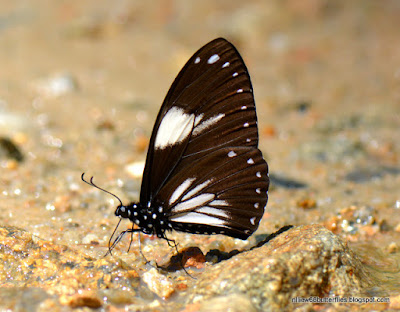Male form aenigma (Wallace)
Probably the commonest form among the many, to be seen singly and sporadically on the water's edge in deeply wooded areas. A good mimic of the male Striped Blue Crow, Euploea mulciber.Habitat indicator
RSP
|
WV
|
PG
|
VF
|
FTR
|
SC
|
LWDF
|
LWPF
|
LMEF
|
UMN
|
MN
|
x
|
x
|
Frequency observation chart: (S marks the usual occurences, H marks an unusually high occurence, F for first record)
2013
| |||||||
Mac
|
Apr
|
May
|
Jun
|
Jul
|
Aug
|
Sep
|
Oct
|
S1
|
S1
| ||||||
2013
|
2014
| ||||||||||
Nov
|
Dec
|
Jan
|
Feb
|
Mac
|
Apr
|
May
|
Jun
|
Jul
|
Aug
|
Sep
|
Oct
|
| S1 | S1 | S2 | S2 | S2 | |||||||
2014
|
2015
|
||||||||||||
Nov
|
Dec
|
Jan
|
Feb
|
Mac
|
Apr
|
May
|
June
|
Jul
|
Aug
|
Sep
|
Oct
|
Nov
|
Dec
|
S1
|
S1
|
S2
|
S2
|
||||||||||
2016
|
|||||||||||
Jan
|
Feb
|
Mac
|
Apr
|
May
|
Jun
|
Jul
|
Aug
|
Sep
|
Oct
|
Nov
|
Dec
|
S1
|
S2
|
||||||||||
|
2017
|
|||||||||||
|
Jan
|
Feb
|
Mac
|
Apr
|
May
|
Jun
|
Jul
|
Aug
|
Sep
|
Oct
|
Nov
|
Dec
|
|
|
|
S1(H)
|
|
|
|
|
|
|
|
|
|
|
2018
|
|||||||||||
|
Jan
|
Feb
|
Mac
|
Apr
|
May
|
Jun
|
Jul
|
Aug
|
Sep
|
Oct
|
Nov
|
Dec
|
|
|
|
|
|
|
|
|
|
|
|
|
|
This is a rare jungle insect and I have encountered it first 3 weeks ago, mistaken it for an Euploe mulciber. Then, it hit me that danaids do not puddle with Graphiums. On close inspection, I realised that it had the typical club antannae of the Graphium butterflies and I disturbed it so that it would take flight to get a better view...Observe that this is not a Danaid...
Above photos taken on 01 May 2013 @ 24 May 2013.
29 September 2013 @ 11:56
12:23
12:31 The above specimen has a much larger forewing (see pix no. 2) in correlation to its hindwing compared to the observed specimen in May 2013.
Above 3 photos from 23 Feb 2014 @ 11:57. As usual, it frequents the water's edge and can easily be confused with the Striped Blue Crow.
They seldom share the same spot by the water's edge but these two don't seem to mind...12 April 2014@ 12:05
Above 3 photos from 12 April 2014 @ 12:09
Above 2 photos 20 April 2014 @ 12:56
14 Feb 2015 @ 12:38
17 Feb 2015 @ 12:25
25 Mac 2017 @ 12:31
* * * * *
Male form aegialus (Distant)
Mimic of the magpie Crow, Euploea radamanthus. Has the same habits of the other forms.
Habitat indicator
RSP
|
WV
|
PG
|
VF
|
FTR
|
SC
|
LWDF
|
LWPF
|
LMEF
|
UMN
|
MN
|
x
|
x
|
Frequency observation chart: (S marks the usual occurences, H marks an unusually high occurence, F for first record)
2013
| |||||||
Mac
|
Apr
|
May
|
Jun
|
Jul
|
Aug
|
Sep
|
Oct
|
S1
| |||||||
2013
|
2014
| ||||||||||
Nov
|
Dec
|
Jan
|
Feb
|
Mac
|
Apr
|
May
|
Jun
|
Jul
|
Aug
|
Sep
|
Oct
|
| S1 | S2 | S2 | |||||||||
2014
|
2015
| ||||||||||||
Nov
|
Dec
|
Jan
|
Feb
|
Mac
|
Apr
|
May
|
June
|
Jul
|
Aug
|
Sep
|
Oct
|
Nov
|
Dec
|
S1
|
S1
| ||||||||||||
2016
|
|||||||||||
Jan
|
Feb
|
Mac
|
Apr
|
May
|
Jun
|
Jul
|
Aug
|
Sep
|
Oct
|
Nov
|
Dec
|
S1
|
S1
|
S1
|
S1S2
|
||||||||
|
2017
|
|||||||||||
|
Jan
|
Feb
|
Mac
|
Apr
|
May
|
Jun
|
Jul
|
Aug
|
Sep
|
Oct
|
Nov
|
Dec
|
|
|
|
S1(H)
|
|
|
|
|
|
|
|
|
|
|
2018
|
|||||||||||
|
Jan
|
Feb
|
Mac
|
Apr
|
May
|
Jun
|
Jul
|
Aug
|
Sep
|
Oct
|
Nov
|
Dec
|
|
|
|
|
|
|
|
|
|
|
|
|
|
The two forms were never seen in the same locality at the same time, often seen only on intervals of each other.
15 September 2013 @ 11:42 - I first saw a solitary male on a moist spot but it flew off and settled on a flowering bush nearby when I tried to approach it...
Then, it reappeared puddling in a nearby moist spot by the stream @ 12:02 together with other Graphiums and a few pierids.
Above 3 photos of the form aegialus in flight next to a stream. 19 Feb 2014 @ 11:00
14 June 2014 @ 12:57
27 April 2014 @ 12:13
Above photos 23 Feb 2015 @ 12:09
04 May 2015 @ 12:23
S1: 23 Jan 2016 @ 12:29
14 May 2016 @ 12:37
12:15
12:24
Above pictures 25 Mac 2017











































No comments:
Post a Comment